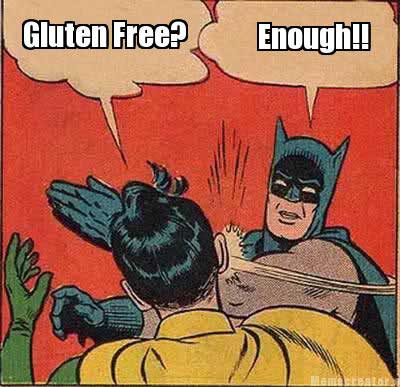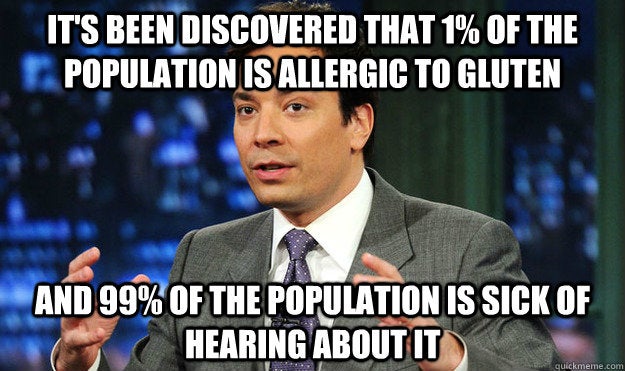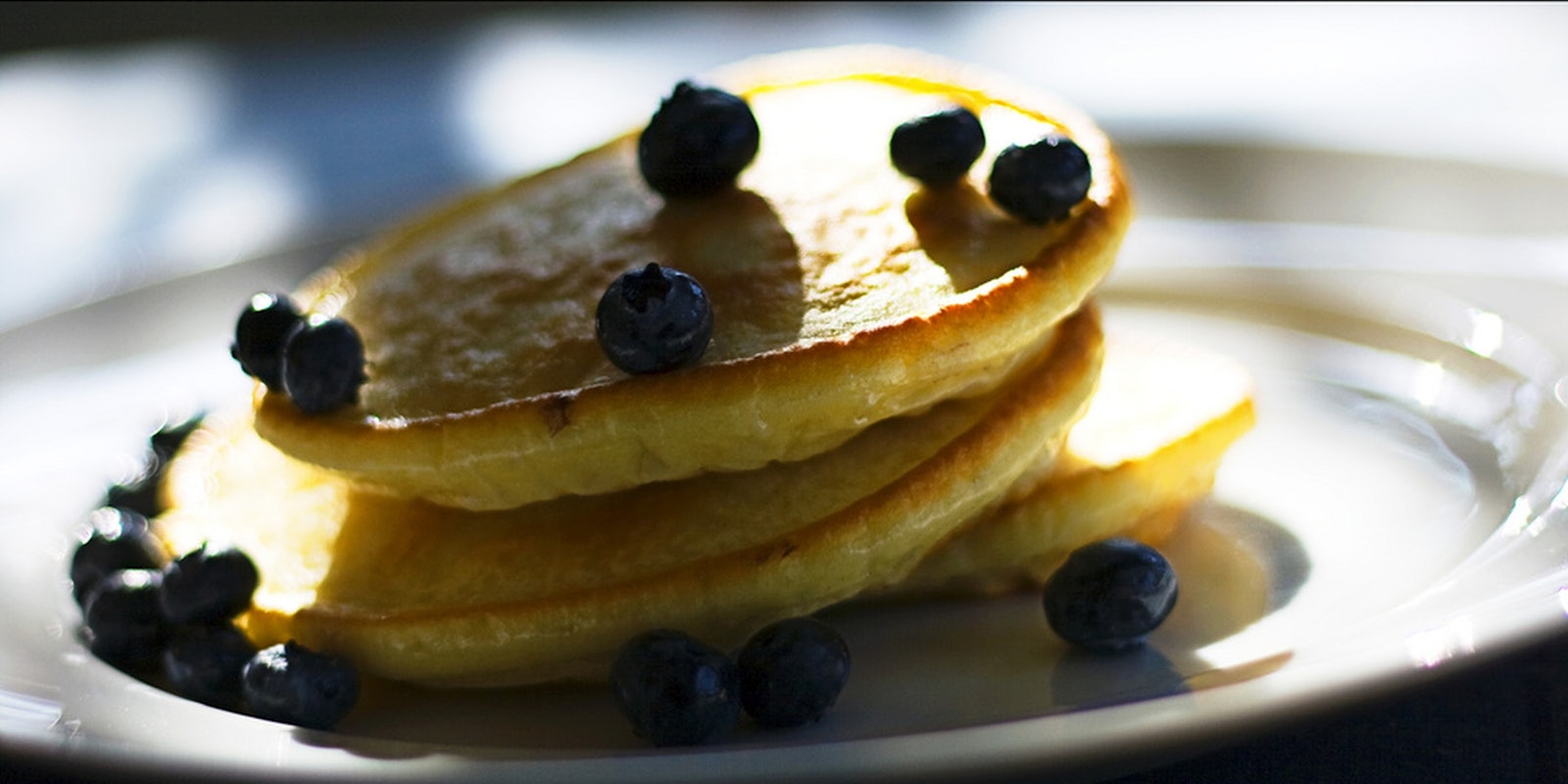Almost twenty years ago, I got really sick.
What had been an irritating “sensitive stomach” became a crippling battle with my gut. I wasn’t hungry, I was nauseous all the time, and my digestion was unpredictable…to put it mildly.
In a matter of a few months, I lost twenty pounds. My parents and boyfriend worried that I was starving myself or purging. They saw how sick I was, but there seemed to be no other logical answer. After all, my doctor couldn’t find a single thing wrong with me and symptoms were hard to pin down.
One year, three medical doctors, and two psychologists later, someone finally thought to send me to an allergist. After a thousand dollars worth of tests, he found antibodies in my blood to three gluten-containing grains (wheat, rye, and barley), as well as the two specific blood markers for Celiac Disease.
I had Celiac Disease, but back then, they called it Non-Tropical Sprue. I went off all forms of gluten, which meant there was pretty much nothing to eat. I had no idea where to start, but I found a Listserv online with my little dial-up modem that was a respite for the few of us who had the condition. The people in that tiny Internet community probably helped save my life. They told me what I could eat, gave me recommendations, and provided emotional support.
A few decades ago, the Internet was the only place I felt my condition and special diet were understood and accepted.
—–
In the last 17 years, I’ve never cheated on my diet. I’ve never snuck a single bite of an Oreo or eaten the cheese off the top of a pizza. Even a tiny crumb can make me sick, so I don’t take the risk. I also didn’t eat in restaurants for about eight years. Finally, I came to trust a few local sushi restaurants and would order just rice, edamame and sashimi. That was a big development for me.
Then suddenly, “gluten-free” became a thing, and it was everywhere. Breads and cookies that actually tasted good showed up on shelves in mainstream grocery stores. A few restaurants like Z-Pizza offered gluten-free options, and they understood the risk of cross-contamination. A specialty bakery opened up here in Los Angeles, and I had my first professionally-made birthday cake in more than a decade. I cried.
But there is a downfall to this gluten-free trend. Most notably, the number of people who find me annoying purely because of my diet, and don’t mind screaming it all over the Internet. It feels like every day there is a new joke in my Facebook or Twitter timelines about people who are gluten-free.

A few weeks ago, the New Yorker shared a cartoon featuring a woman leaning into her friend at a café and saying, “I’ve only been gluten free for a week, but I’m already really annoying.” Not long after, Jimmy Kimmel decided to poll random fitness fanatics in L.A. who claim to be gluten free, in order to find out if they actually even know what gluten is. None did, of course—at least none of the people they chose to show in the clip.
At first this trend of jokes about gluten seemed sort of funny, but then I realized that their rising popularity was affecting people’s perception of me. While shopping for potato vodka at the grocery store last week, a sales clerk offered to help me find what I was looking for. I told him I needed gluten-free vodka, since they were out of Chopin. He proceeded to laugh in my face and say, “Oh, you’re one of those girls? Do you even know what gluten is?”
—–
I get the temptation to make fun of the trend-followers, and it’s easy to just hit “share” and not think about how people will be personally affected by what you’re putting out there. But what we’re doing every time we hit “share” is normalizing a message. A lot of times that’s a great thing; Upworthy has made a business out of normalizing progressive values by making content super-shareable. But other times, it serves to empower people to disregard others’ feelings.
So I’m going to turn the tables on those super-shareable memes about annoying gluten-free people a minute, so you can hear what a gluten-free person thinks is annoying.

It’s annoying to be lumped in with people who don’t know what they’re talking about when they say they’re gluten free. It’s even more annoying when people assume I’m using my diet to get attention.
It’s annoying when, at Thanksgiving dinner, a member of my own family rolls his eyes as I try to politely pass on a dish because it has gluten it. It’s annoying to feel like I have to choose between my health and not making people annoyed.
It’s annoying that when I was twenty years old, I had the bones of a seventy year-old woman from all the years that Celiac Disease ravaged by body. It was annoying that my boyfriend and roommates had to take me to the hospital after finding me unconscious on the floor because I got a little bit of gluten by accident and was sick all night.
It’s annoying that you know nothing about what it’s like to have to follow a rigid diet, but you feel empowered to let everyone on Facebook know that people who are gluten-free piss you off. It’s annoying that you think when you share a joke about “fake” gluten-free people that I won’t be affected.
Here’s the reality: The last thing I want attention for is my medical condition. I don’t really want to talk about it, and I wish I didn’t have to pull the server aside to ask what is okay for me to eat. But it’s my reality, and I’ll always be grateful that I am able to treat my condition with something as simple as a special diet.
What’s annoying is when the New Yorker, Jimmy Kimmel, or the guy eating dinner with me makes a joke about how annoying my diet is. And it’s annoying how empowered they all feel to make me feel like an asshole, because they’ve seen that same joke in their timelines a dozen times.
But I think the most annoying thing is how trendy it is to share a stupid meme that minimizes my medical condition.
Joanna Schroeder serves as executive editor of the Good Men Project and is a freelance writer whose work has appeared on sites like xoJane, hlntv.com, and the Huffington Post.
Photo via ugod/Flickr (CC BY 2.0)


